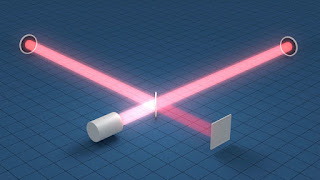 |
| Image Source: LIGO.Caltech.edu/detection |
Topics: Einstein, General Relativity, Gravitational Waves, Research, Theoretical Physics
The Physics World 2016 Breakthrough of the Year goes to "the LIGO Scientific Collaboration for its revolutionary, first-ever direct observations of gravitational waves". Nine other achievements are highly commended and cover topics ranging from nuclear physics to material science and more.
Almost exactly 100 years after they were first postulated by Albert Einstein in his general theory of relativity, gravitational waves hit the headlines in 2016 as the US-based LIGO collaboration detected two separate gravitational-wave events using the Advanced Laser Interferometer Gravitational-wave Observatory (aLIGO). The first observation was made on 14 September 2015 and was announced in February this year. A second set of gravitational waves rolled through LIGO's detectors on 26 December 2015, and this so-called "Boxing Day event" was announced in June this year. Gravitational waves are ripples in the fabric of space–time, and these observations mark the end of a decades-long hunt for these interstellar undulations.
The measurements also herald the start of the era of gravitational-wave astronomy and multi-messenger astronomy, whereby gravitational-wave observations are combined with those made by optical and radio telescopes and other detectors observing the cosmos. Indeed, LIGO's twin detectors will soon be joined by a global network of gravitational-wave detectors.
The top 10 breakthroughs were chosen by a panel of four Physics World editors and reporters, and the criteria for judging included:
- fundamental importance of research;
- significant advance in knowledge;
- strong connection between theory and experiment; and
- general interest to all physicists.
Physics World:
LIGO's gravitational-wave discovery is Physics World 2016 Breakthrough of the Year
Comments